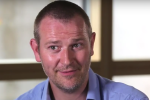About BABEL
The interdisciplinary BABEL project explores healthcare decisions for individuals who are deemed to be unable to make decisions for themselves. When someone is considered to lack what the law calls ‘mental capacity’ or ‘competence’, then decisions must be made in their 'best interests'.
Best interest decisions may be made concerning children – as poignantly illustrated in the widely-publicised legal case of Charlie Gard – and adults, including those with learning disabilities, dementia or prolonged disorders of consciousness.
BABEL asks how the 'best interests' of such patients should be understood – which factors and values should be considered, who should be involved, and indeed whether ‘best interests' is even the best approach.
BABEL is led by Professor Richard Huxtable, and the project team comprises Professor Judy Laing, Professor Sheelagh McGuinness and Dr Aoife Finnerty from the Centre for Health, Law and Society (CHLS), and Professor Jonathan Ives, Dr Giles Birchley and Dr Emanuele Valenti from the Centre for Ethics in Medicine (CEM).
This project substantially builds on work already conducted by CEM and CHLS, including on a Wellcome Trust funded Seed project, and is supported by a broad multi-disciplinary team of researchers, patients and professionals from Bristol and beyond.
The £1.5 million grant funds a 5-year programme of work, across four distinct workstreams, and includes PhD studentships, a visiting fellow scheme, and a programme of public engagement work.
Research Questions
BABEL seeks to answer the following three research questions:
Research question 1: What is the nature and purpose of the best interests standard (BIS) in medico-legal decision-making?
Research question 2: How does the best interests standard currently operate in medico-legal decision-making?
Research question 3: How should the best interests standard operate in medico-legal decision-making?

We are absolutely thrilled that the Wellcome Trust has chosen to support this important project. Best interests decisions are taken daily for thousands of patients and we hope, through our five years of work, to help support and inform everyone involved, from patients to carers to professionals
Study Design
BABEL is an interdisciplinary project that draws on a range of different methods of data collection and analysis, comprising both empirical and theoretical components. This requires an approach to research methodology that is able to integrate different kinds of data and synthesise different kinds of analysis.
Although BABEL adopts this broad orientation, specific approaches to specific questions will be developed within each workstream.
Richard, Jon, Giles and Emanuele work on WS1, which is exploring the perspectives of health professionals, patients, and those close to them. We involved various members of the public, as well as people with lived experience of “best interests” decisions, in discussions about planning and designing the BABEL project. In particular, members of the BABEL project team had meetings with people from the following groups:
- West of England Centre for Inclusive Living (WECIL). Richard and Suzanne (from WS2) met with a group in April 2019.
- People in Health West of England. Giles met with a group in May 2021.
- Bristol Young People’s Advisory Group. Giles and Jon met with a group in May 2021.
- ReMemBer Dementia PPI Group. Giles, Richard and Emanuele met with a group in May 2021.
We’re very grateful to everyone who met with us to discuss the project and who contributed to the design of the project.
-
Professor Richard Huxtable (BABEL director, Workstream leader)
Richard trained in law, and directs the Centre for Ethics in Medicine in Bristol Medical School. He has particular interests in end-of-life decisions, treatment withdrawal, surgery, and clinical ethics support. His prior work on ‘best interests’ decisions includes the book Law, Ethics and Compromise at the Limits of Life: To Treat or Not to Treat? (2012, Routledge). He serves on a range of journals and committees, including the ethics committees of the British Medical Association and the Royal College of General Practitioners. Richard leads the teaching in ethics and law for medical students in Bristol.
-
Professor Judy Laing (BABEL Co-Deputy Director, Workstream leader)
Judy is based at the Centre for Health, Law, and Society in Bristol Law School and has expertise in mental health/capacity law, and human rights. She has experience of teaching health law, at both undergraduate and postgraduate level, at several universities in the UK. She currently co-directs the Centre for Health, Law, and Society, which is based in the Law School. Judy has written extensively on aspects of mental health/capacity law, and her publications include co-editing one of the leading medical law texts, Principles of Medical Law (Oxford University Press, 2018), currently in its fourth edition. Judy is also a member of the Editorial Board of two leading medico-legal journals – the Medical Law Review and International Journal of Law & Psychiatry.
-
Professor Jonathan Ives (BABEL Co-Deputy Director, Workstream leader)
Jonathan is an interdisciplinary bioethics researcher, trained in Philosophy and with experience of a wide range of social science research methods. He is deputy director of the Centre for Ethics in Medicine and leads workstream 3 of BABEL. He has a particular interest in bioethics research methodology, and works on issues around parenting and reproduction, clinical and research ethics. His work includes the co-edited book Empirical Bioethics: Theoretical and Practical Perspectives (2016, Cambridge University Press).
-
Professor Sheelagh McGuinness (Workstream co-leader)
Sheelagh is a Reader in Law at the Centre for Health, Law, and Society at University of Bristol Law School. She has expertise in health law and reproduction and teaches both undergraduate and postgraduate students across a range of health law related subjects. Sheelagh’s primary research interests are in the regulation of reproduction.
-
Dr Giles Birchley (Workstream researcher)
Giles has worked as a researcher at the University of Bristol’s Centre for Ethics in Medicine since 2015 and works on BABEL workstream 3. Giles is a nurse and has extensive clinical experience in children's intensive care. Ethical dilemmas surrounding children’s medical treatment are a key research interest, as well as how we do and should make decisions for others more generally.
-
Dr Aoife Finnerty (Workstream researcher)
Aoife is a Senior Research Associate in Healthcare Law at the Centre for Health, Law, and Society at University of Bristol Law School and works on BABEL workstream 2. Prior to joining the BABEL Project, Aoife worked as a postdoctoral researcher on the JCOERE Project based at University College Cork. She holds a Master of Arts in Medical Ethics and Law from King’s College London and a PhD from the University of Limerick. Her doctoral research focused on advance decision-making in pregnancy in Ireland, England and Wales and New York State.
-
Dr Emanuele Valenti (Workstream researcher)
Emanuele is a Senior Research Associate in Healthcare Ethics at the Centre for Ethics in Medicine, in Bristol Medical School. He has a background in philosophy and has expertise in qualitative research, and his primary role in BABEL is on workstream 1. His research interests are broadly focused on mental health and coercion, with a particular interest in ethical issues arising in mental healthcare and the role of best interests in decision making processes for people with mental disabilities.
-
Rebecca Stickler (Workstream researcher)
Rebecca is a is a Senior Senior Associate Teacher at the Centre for Health, Law, and Society at University of Bristol Law School and works on BABEL workstream 2. After completing her law degree at the University of Oxford, Rebecca practised as a barrister in England and Wales between 2007 and 2018 specialising in Mental Capacity and Public Law. She has extensive experience of working with the Court of Protection and was repeatedly ranked as a leading barrister for Court of Protection and Public Law in legal directories. Between 2019 and 2022, Rebecca worked as a Research Fellow with the 3-year AHRC-funded project, Judging Values and Participation in Mental Capacity Law in the Institute for Crime and Justice Policy Research at Birkbeck College, University of London.
Previously involved with the BABEL team
-
Dr Suzanne Doyle Guilloud
Suzanne worked on the BABEL project from Autumn 2018 until Summer 2021 as a Senior Research Associate in Healthcare Law on the initial, mapping stage of the project, for BABEL Workstream 2. Suzanne took up a post as a postdoctoral researcher at the Centre for Disability Law and Policy at the NUI Galway School of Law in August 2021.
-
Corinna Chandler
Corinna worked as the Research Administrator for the BABEL team from October 2018 until April 2023. She is now based in the Faculty of Science at the University, as a Project Coordinator.









